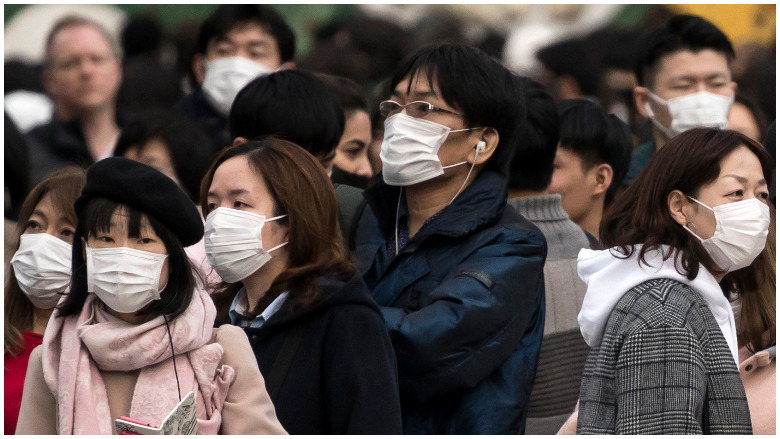
Getty
As coronavirus rampages throughout the globe, a lot of people have questions about how it’s transmitted. Among them: How does coronavirus affect pregnant women? Are they more susceptible to the virus?
To be sure, there’s a lot that’s not known about coronavirus. It’s a relatively new virus on the world stage, and Chinese authorities are notoriously secretive. The Centers for Disease Control and Protection advises: “Pregnant women should engage in usual preventive actions to avoid infection like washing hands often and avoiding people who are sick.”
Here’s what you need to know:
There’s Not a Lot of Research About Coronavirus & Pregnant Women But Precautions Are Suggested

GettyTourist wearing protective respiratory masks tour St. Peter’s Square prior to the Pope’s weekly Angelus prayer on February 2, 2020 in the Vatican.
The Centers for Disease Control and Prevention has an entire page devoted to pregnancy and coronavirus. “Are pregnant women more susceptible to infection, or at increased risk for severe illness, morbidity, or mortality with COVID-19, compared with the general public?” CDC asks.
The answer, according to CDC: “We do not have information from published scientific reports about susceptibility of pregnant women to COVID-19. Pregnant women experience immunologic and physiologic changes which might make them more susceptible to viral respiratory infections, including COVID-19. Pregnant women also might be at risk for severe illness, morbidity, or mortality compared to the general population as observed in cases of other related coronavirus infections [including severe acute respiratory syndrome coronavirus (SARS-CoV) and Middle East respiratory syndrome coronavirus (MERS-CoV)] and other viral respiratory infections, such as influenza, during pregnancy.”
As for the impact on pregnant women, CDC added, “We do not have information on adverse pregnancy outcomes in pregnant women with COVID-19. Pregnancy loss, including miscarriage and stillbirth, has been observed in cases of infection with other related coronaviruses [SARS-CoV and MERS-CoV] during pregnancy. High fevers during the first trimester of pregnancy can increase the risk of certain birth defects.”
What about pregnant healthcare workers who could be exposed to the virus? According to CDC:
“Pregnant healthcare personnel (HCP) should follow risk assessment and infection control guidelines for HCP exposed to patients with suspected or confirmed COVID-19. Adherence to recommended infection prevention and control practices is an important part of protecting all HCP in healthcare settings. Information on COVID-19 in pregnancy is very limited; facilities may want to consider limiting exposure of pregnant HCP to patients with confirmed or suspected COVID-19, especially during higher risk procedures (e.g., aerosol-generating procedures) if feasible based on staffing availability.”
It’s not clear whether a mother can transmit the virus to a baby. “The virus that causes COVID-19 is thought to spread mainly by close contact with an infected person through respiratory droplets. Whether a pregnant woman with COVID-19 can transmit the virus that causes COVID-19 to her fetus or neonate by other routes of vertical transmission (before, during, or after delivery) is still unknown. However, in limited recent case series of infants born to mothers with COVID-19 published in the peer-reviewed literature, none of the infants have tested positive for the virus that causes COVID-19. Additionally, virus was not detected in samples of amniotic fluid or breastmilk,” says CDC.
Coronavirus Mainly Spreads Through Respiratory Droplets But Can Be Spread By Touching a Surface or Object

GettySecurity guards patrol outside the Huanan Seafood Wholesale Market where the coronavirus was detected in Wuhan on January 24, 2020 – The death toll in China’s viral outbreak has risen to 25, with the number of confirmed cases also leaping to 830, the national health commission said.
The Centers for Disease Control and Prevention has an entire page devoted to how coronavirus spreads. The CDC says:
The virus is thought to spread mainly from person-to-person.
Between people who are in close contact with one another (within about 6 feet).
Through respiratory droplets produced when an infected person coughs or sneezes.
These droplets can land in the mouths or noses of people who are nearby or possibly be inhaled into the lungs.
The CDC does add: “It may be possible that a person can get COVID-19 by touching a surface or object that has the virus on it and then touching their own mouth, nose, or possibly their eyes, but this is not thought to be the main way the virus spreads.”
According to CDC, “CDC is responding to an outbreak of respiratory disease caused by a novel (new) coronavirus that was first detected in China and which has now been detected in almost 90 locations internationally, including in the United States. The virus has been named ‘SARS-CoV-2’ and the disease it causes has been named ‘coronavirus disease 2019’ (abbreviated ‘COVID-19’).”
CDC concludes, “While information so far suggests that most COVID-19 illness is mild, a reportexternal icon out of China suggests serious illness occurs in 16% of cases. Older people and people of all ages with severe underlying health conditions — like heart disease, lung disease and diabetes, for example — seem to be at higher risk of developing serious COVID-19 illness.”
READ NEXT: Can Pets Get Coronavirus?